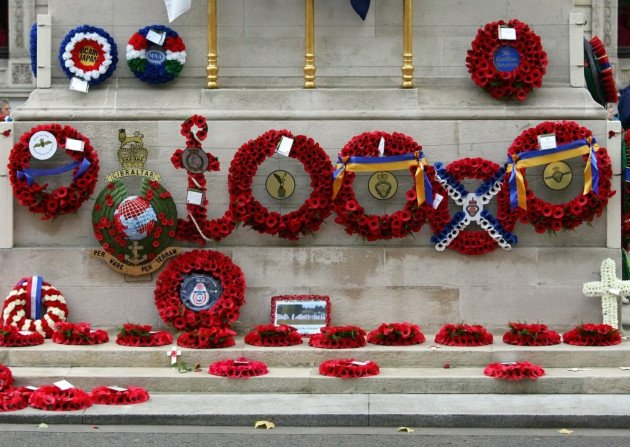
The UK is marking Remembrance Sunday with Queen Elizabeth II to lead commemorations later to honor members of the armed forces killed in conflict.
She will be joined by political leaders and veterans for a ceremony at the Cenotaph in London – the focal point of the UK’s Remembrance Sunday services.
Edinburgh, Cardiff and Belfast will be among the places paying their respects.
This year marks the 100th anniversary of the start of World War One, 70 years since the D-Day landings and the end of Britain’s conflict in Afghanistan.
UK’s PM David Cameron said the anniversaries made 2014’s commemorations “particularly poignant”.
Scotland Yard said there would be “appropriate and proportionate” policing at the Cenotaph after four men were arrested on November 6 in west London and High Wycombe in connection with an alleged Islamist terror plot on British soil.
David Cameron said: “Today we stand united to remember the courageous men and women who have served our country, defended our freedoms and kept us safe.
“We remember all those who have fallen and those who have risked their lives to protect us.
“We owe each and every member of our armed forces and the families who support them a tremendous debt – one that can never be repaid – and I pay huge tribute to their bravery and resolve.”

Queen Elizabeth will be joined by the Duke of Edinburgh for the wreath-laying ceremony at the Cenotaph in Whitehall, along with the Prince of Wales and Duchess of Cornwall and Earl and Countess of Wessex.
After dusk falls, images of falling poppies are to be projected on to Big Ben, officially known as Parliament’s Elizabeth Tower.
On November 8, the Queen and other members of the Royal Family joined veterans and the public at the Royal British Legion’s annual Festival of Remembrance at the Royal Albert Hall in London.
Elsewhere on November 9, a service will also be held at the National Memorial Arboretum in Staffordshire.
In Glasgow a two-minute silence will be observed at the cenotaph in George Square, while in Edinburgh a parade will take place from the castle esplanade to the city’s stone of remembrance.
Scotland’s First Minister Alex Salmond will be among those laying wreaths and a ceremonial gun will be fired.
Meanwhile, the National Secular Society has written to the government asking it to review the role of the Church of England at the national ceremony of remembrance, which it argues should be equally inclusive of all citizens, regardless of religion and belief.
The society believes the commemoration should be redesigned to make it an inclusive national event, not led by a single Christian denomination.
Earlier this week, David Cameron announced that a key part of the World War One poppy display at the Tower of London is to remain in place until the end of November.
The installation of ceramic poppies, entitled Blood Swept Lands And Seas Of Red, is to be dismantled on November 12.
The Wave segment will now stay in place until the end of the month before being sent on a tour across the UK until 2018, when it will be joined by the installation’s Weeping Window segment.
[youtube 608XDda_es4 650]